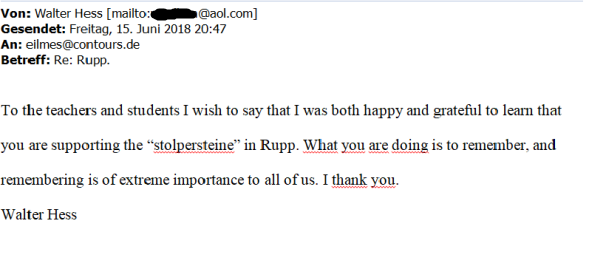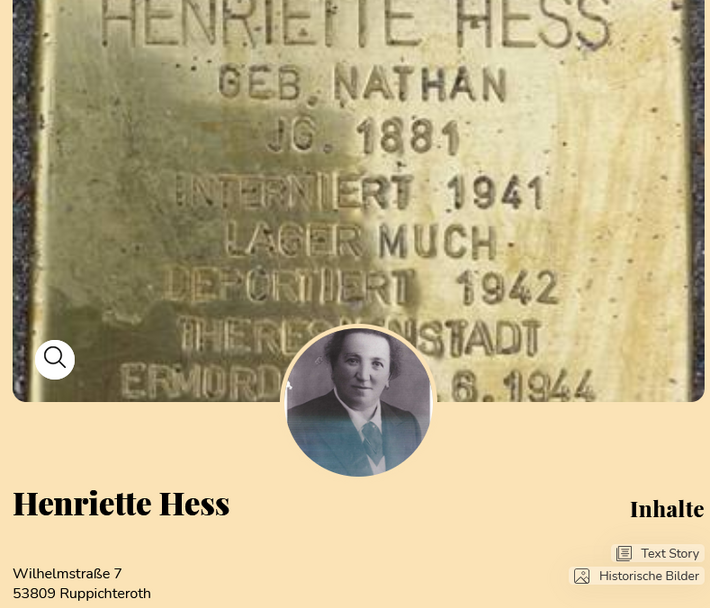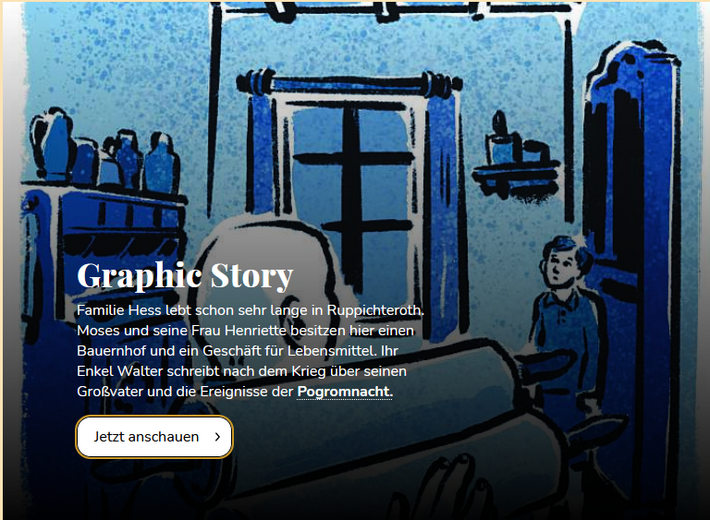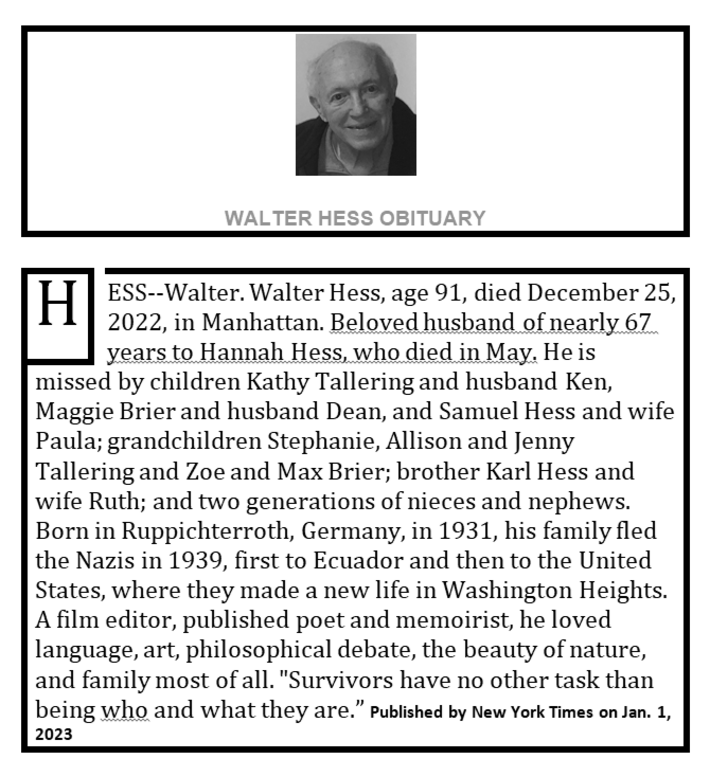The importance of Walter Hess for the local history of Ruppichteroth
There are only a few families in Ruppichteroth of whom we have as much information as from the Hess family, as their son Wolfgang/Walter Hess (born 1931) wrote down his experiences - including those in Ruppichteroth - in detail in his book "A Refugee's Journey, A Memoir". Wolfgang/Walter and his mother Melitta Hess also took part in the documentary film "We were so beloved" produced in New York in 1986 and reported about their life in Ruppichteroth, their escape to New York via Ecuador and their difficult start and later life in New York.
His poetry book "Jew's Harp" contains 30 poems in which he describes various stages of his life in poetic form, including "Heimat", "1938" and "Opa - The Old Synagogue" (= the one in Ruppichteroth).
The author of these lines here was able to visit Walter Hess and his wife Hannah in their New York apartment on the edge of Central Park in Manhattan in 2018.
Through the diverse and extensive publications by Walter Hess (the book "A Refugee's Journey" alone has 319 pages), we get a deep insight into the life of Jewish families in the 1930s.
From the point of view of those affected, we learn about the harassment of the Nazis, the problems of preparing and carrying out the flight from Ruppichteroth via the Netherlands to Panama and Ecuador and then to the actual destination New York, where the family have to learn a language they have not spoeken until then (English ) and had to plan and shape life from scratch.
Walter Hess grew up on a farm in Wilhelmstrasse in Ruppichteroth, where he also attended the local primary school. In New York he attended high school and later earned his living as a film producer and "film cutter". After numerous attempts in various professions, his father Oskar Hess, a former Ruppichteroth farmer, finally opened a painting business, although he was afraid of heights and could not even climb a ladder while he lived in Germany.
The works of Walter Hess enable us to take a close look at the darkest chapter of German and Ruppichteroth history from a perspective that we were previously unaware of as far as our small community was concerned and that differs in many aspects from some previous depictions of our local history.
You can find some examples of this under the following link:
http://www.bilderbuch-ruppichteroth.de/geschichte/juedische-geschichte/juedische-familien-in-ruppichteroth/wolfgang/walter-hess-aus-unserer-sicht.htm
A brief overview of the life of the Hess family and the career of Wolfgang/Walter Hess can be found here:
Walter Hess made a lasting contribution to the description and understanding of the worst chapter in German and Ruppichteroth history and imparted experiences whose significance goes far beyond the community of Ruppichteroth. For this he deserves eternal thanks.
Works by/with Walter Hess:
Film: We Were So Beloved: The German Jews of Washington Heights, film, © 1986 by Manfred Kirchheimer (367 Seiten)
Book to the film: Manfred Kirchheimer and Gloria DeVidas Kirchheimer, We Were So Beloved: Autobiography of a German Jewish Community (University of Pittsburgh Press, 1997) (367 Seiten)
Book: „Refugee‘s Journey: A Memoir“, by Walter Hess (319 Seiten)
Poetry: „Jew's Harp", by Walter Hess
"New York is my home, but Ruppichteroth is my Heimat"
Even during his time in New York Walter Hess never lost contact with Ruppichteroth. When my wife and I visited him in 2018, he showed us 2 books from the series "Ruppichteroth im Spiegel der Zeit" by Harry Hendriks right at the beginning. He visited Ruppichteroth during his military service in Germany in the 1950s and then again in the 1980s.
During our visit in 2018, the author of these lines asked about his feelings about Ruppichteroth. This was his answer:
"New York is my home, but Ruppichteroth is my heimat"
In the same conversation he said at some point: "Maybe my fate wasn't all that bad after all. Who knows what would have become of me as a farmer's son in Ruppichteroth. ... As a filmmaker in New York, I had a good and interesting life."
Both in the conversation during the visit to New York in 2018 and in his statements in the film and in the book, Walter Hess always tried to understand and explain the circumstances that forced him and his family to leave Ruppichteroth and that forced his grandparents to end life in the concentration camp. He never did so in a bitter or reproachful manner.
He saw it as his task to describe these circumstances precisely and clearly in order to help ensure that something like that never happens again.
When I reported to him in the summer of 2018 about the forthcoming laying of the first stumbling blocks in Ruppichteroth (for his grandparents Moses and Henriette Hess, among others) and informed him, among other things, that the first stumbling blocks had been donated by schoolchildren, he wrote the following message to the schoolchildren and teachers:

The Hess family in the WDR app Stolpersteine NRW
Walter Hess's descriptions of the living conditions of the Hess family by Walter Hess also impressed the makers of the WDR* app Stolpersteine NRW so much that they dedicated 2 professionally made stories to the family:
WDR*: = Westdeutscher Rundfunk (Köln), biggest radio- and television station in Germany.

If you would like to hear this text story, click on the following link: https://stolpersteine.wdr.de/web/de/stolperstein/10178
Then click on "Text Story" and then (in the image below) on "Read Text" and listen to the text. Don't forget to turn on the phone/computer speakers.
If you would like to hear and see this graphic story on the "1938 synagogue fire in Ruppichteroth", click on the following link: stolpersteine.wdr.de/web/de/stolperstein/10177
Then click on "Graphic Stories" and then (in the image below) on "Watch Now". Then start the story by clicking on the arrow. When the picture has been described, click the arrow again. Don't forget to turn on the phone/computer speakers.
Wolfgang/Walter Hess and his family will always have an honorable place in the history of Ruppichteroth.
May his soul be bound in the bundle of life.
Text:
Wolfgang Eilmes, January 2023

